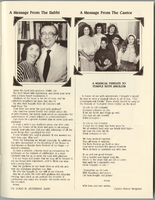Search the Special Collections and Archives Portal
Search Results

Transcript from interview with Mike Unger by Barbara Tabach, January 21, 2016
Date
Archival Collection
Description
In this interview, Unger reflects upon his long and successful career in hotel management in Las Vegas and also in Arizona and Pennsylvania. He shares stories as a local celebrity, particularly in the 1970s and 1980s when he worked at Caesars Palace, as well as the big projects he oversaw, including organizing the first big fight nights, World Series of Tavern Poker and Grand Prix race. He talks about working with Morris Shenker, Moe Dalitz, Cliff Perlman and Billy Weinberger, and the role of the Jewish community in the city, and specifically in the gaming industry. Unger also discusses his non-gaming industry ventures which have included a satellite communications business and a bagel business.
Mike Unger was born in Queens, New York in 1947, and spent most of his childhood in Long Island, growing up in a predominantly Jewish and Italian community. As a young adult, Unger was already working hard, running one of his family?s restaurant after school. When he was in high school, his family moved to Los Angeles to accommodate his father?s health needs, and eventually end up in Las Vegas by 1967. Over the next two decades, Unger would work at nine properties in the city. Unger is one of the University of Nevada, Las Vegas? first hotel management graduates, and started his career with Summa Corporation in its management training program at the Frontier Hotel and Casino. After a brief stint at the Airport Marina Hotel in Los Angeles in 1972, Unger returned to Las Vegas, serving in management capacities at the Aladdin Hotel and Casino, Summa Corporation headquarters and Landmark Hotel and Casino. In 1978, he joined Caesars Palace Hotel and Casino management team, and was integral in creating the city?s first large boxing events, the World Series of Tavern Pool, and the Grand Prix race. Unger also ran properties for the White Mountain Apache and Colorado River Indian Tribes in Arizona, as well as the Showboat Hotel and Casino. In this interview, Unger reflects upon his long and successful career in hotel management in Las Vegas and also in Arizona and Pennsylvania. He shares stories as a local celebrity, particularly in the 1970s and 1980s when he worked at Caesars Palace, as well as the big projects he oversaw, including organizing the first big fight nights, World Series of Tavern Poker and Grand Prix race. He talks about working with Morris Shenker, Moe Dalitz, Cliff Perlman and Billy Weinberger, and the role of the Jewish community in the city, and specifically in the gaming industry. Unger also discusses his non-gaming industry ventures which have included a satellite communications business and a bagel business.
Text

Transcript of interview with Bobby Morris by Barbara Tabach, March 24, 2016
Date
Archival Collection
Description
In this interview, Morris reflects upon his career and the wide range of influential artists he has worked with, as a drummer, musical director and talent manager. Stories include playing with Louis Prima, live and on albums; serving as Elvis? musical director; filling in for Frank Sinatra?s drummer; entertaining Howard Hughes; and playing at President John F. Kennedy?s inauguration, to name a few. He also talks about his agency, attributing its success to the strong relationships he built with casino management.
Text

Transcript of interview with Martin, Linda, and Robert Wilner by Barbara Tabach, May 10 & 24, 2016
Date
Archival Collection
Description
During the early 1970s, the boom of Las Vegas included many single people following family who had already settled there. Among those was Martin (Marty) Wilner. Marty?s parents were Leo and Mickey Wilner. Leo moved to Las Vegas to become the Executive Director at Temple Beth Sholom, the only synagogue in town. Marty, who was born and raised in California, had recently earned his doctorate in psychology at the University of Houston. He became a counselor at UNLV. Not long after, Marty met Linda at a Jewish Singles event. Linda was a divorced, mother of three children, who had moved from California to find comfort in living near her parents. Robert Wilner is one of her three children. He was adopted by Marty and works with his mother in the real estate business. In this interview, they recall together the Las Vegas of the 1970s. For Robert, he remembers his bar mitzvah, and growing up with Jewish friends under the careful eye of his grandparents. As an adult, he has enjoyed a successful career as a real estate agents working with his mother. For Linda, the success of real estate was being part of one of the most robust housing markets in the country. She and Robert recall an extensive list of visionaries who developed the valley, as well as the inherent challenges of water, unions and maintaining their high level of ethics.
Text

